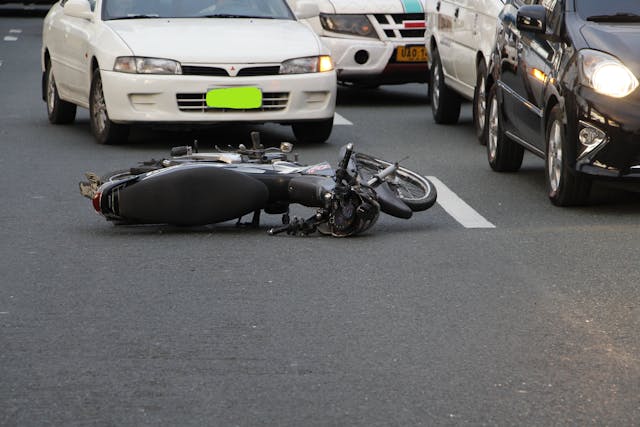What to Do After Being in a Motorcycle Accident: A Comprehensive Guide
Motorcycle accidents can be traumatic and disorienting experiences, often leading to serious injuries and significant emotional distress. Knowing what steps to take immediately after an accident can make a crucial difference in protecting your health, legal rights, and financial future. This comprehensive guide will provide you with a detailed, step-by-step approach on what to do after being in a motorcycle accident, ensuring you are well-prepared to handle the situation effectively.
Immediate Steps to Take at the Scene Being in a Motorcycle Accident
- Ensure Safety
Check Yourself and Others for Injuries: Your first priority is to ensure your safety and the safety of others involved. Check yourself for any injuries and try to move to a safe location if you are able to do so. If possible, also check on other people involved in the accident.
Move to a Safe Location: If the accident has occurred in a dangerous location (such as in the middle of a busy road), try to move yourself and your motorcycle out of the way of traffic to prevent further accidents. Turn on your hazard lights and set up road flares or warning triangles if available.
- Call Emergency Services
Contact 911: Call emergency services immediately to report the accident. Provide them with the location of the accident, the number of vehicles involved, and any known injuries. It is important to have medical professionals evaluate everyone involved, even if injuries are not immediately apparent.
- Do Not Admit Fault
Avoid Admitting Fault: At the scene of the accident, it is crucial not to admit fault or apologize. Statements made in the heat of the moment can be misinterpreted and used against you later. Instead, focus on exchanging information and assisting where needed.
Gather Information and Evidence
- Exchange Information
Get Details from Other Parties: Collect the following information from all drivers involved:
– Names and contact information
– Driver’s license numbers
– Vehicle registration and license plate numbers
– Insurance information (company and policy number)
Get Details from Witnesses: If there are any witnesses, ask for their names and contact information. Witness statements can be valuable in supporting your version of events.
- Document the Scene
Take Photographs: Use your phone or camera to take pictures of the accident scene from multiple angles. Include photos of:
– All vehicles involved and their damage
– Your motorcycle and any visible injuries
– Road conditions, traffic signs, and any skid marks
– The surrounding area (e.g., intersections, road signs, weather conditions)
Make Notes: Write down details about the accident while they are fresh in your mind. Include the time and date, location, weather conditions, and a description of what happened.
- File a Police Report
Provide a Statement: When the police arrive, provide them with a clear and concise statement of what happened. Stick to the facts and avoid speculating or admitting fault. Obtain a copy of the police report for your records, as it will be important for insurance and legal purposes.
Seek Medical Attention
- Get a Medical Evaluation
Immediate Medical Attention: Even if you feel fine, seek medical attention immediately. Some injuries may not be apparent right away but could become serious if left untreated. A medical professional can provide a thorough evaluation and document any injuries.
Follow-Up Appointments: Follow through with any recommended follow-up appointments or treatments. Keep detailed records of all medical visits, treatments, and expenses, as these will be crucial for any insurance claims or legal actions.
Notify Your Insurance Company
- Report the Accident
Contact Your Insurer: Notify your insurance company about the accident as soon as possible. Provide them with all necessary details and cooperate with their investigation. Be honest and accurate in your account, but avoid making speculative statements or admitting fault.
Provide Documentation: Submit any photographs, witness information, and the police report to your insurer. Detailed documentation will help support your claim and expedite the process.
Legal Considerations
- Consult a Motorcycle Accident Lawyer
Seek Legal Advice: If the accident resulted in significant injuries, disputed liability, or substantial property damage, consider consulting a motorcycle accident lawyer. An experienced attorney can help protect your rights, negotiate with insurance companies, and ensure you receive fair compensation.
- Preserve Evidence
Maintain Records: Keep all records related to the accident, including medical bills, repair estimates, and correspondence with insurance companies. This documentation will be important if you decide to pursue a legal claim.
Avoid Discussing the Accident Publicly: Refrain from discussing the accident on social media or with anyone other than your lawyer and insurance company. Public statements can be used against you in legal proceedings.
Long-Term Steps
- Follow Through with Medical Treatment
Adhere to Medical Advice: Follow your doctor’s advice and complete any prescribed treatment plans. Consistent medical care not only aids in your recovery but also strengthens your claim by demonstrating the seriousness of your injuries.
- Consider Physical and Emotional Recovery
Physical Rehabilitation: Depending on your injuries, physical therapy may be necessary to regain full function. Engage in prescribed exercises and attend all therapy sessions.
Emotional Support: Motorcycle accidents can be traumatic, leading to emotional distress such as anxiety or PTSD. Consider seeking counseling or joining a support group to address these issues.
Conclusion
Being involved in a motorcycle accident is a distressing experience, but knowing what steps to take can help protect your health, legal rights, and financial future. By ensuring safety, gathering information, seeking medical attention, and consulting with professionals, you can navigate the aftermath more effectively. Whether dealing with insurance claims or potential legal actions, having a clear plan and the right support can make all the difference in your recovery and resolution process.
